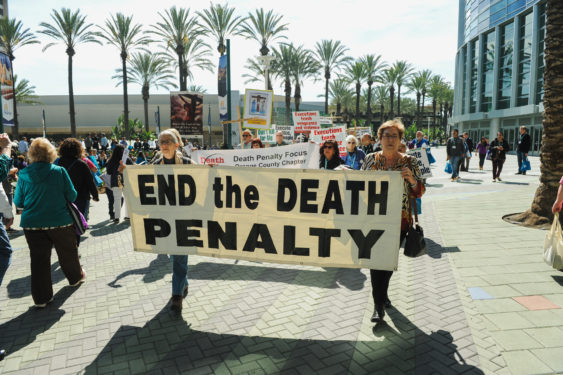By Christopher White, The Tablet’s National Correspondent

NEW YORK – The death penalty is dying.
According to a new report released by the Death Penalty Information Center (DPIC), executions in the United States are at a historic low. For the fourth consecutive year, there have been fewer than 30 executions and 50 death sentences.
A total of 23 executions took place in 2018, with more than half of those, 13, occurring in Texas.
Such news comes during a year when the Catholic Church has had its own evolvement on the issue.
In August, Pope Francis announced that he was formally changing the Catechism of the Catholic Church to declare the practice “inadmissible.”
“The death penalty is inadmissible because it is an attack on the inviolability and dignity of the person,” reads the Catechism now, with the addition that the Church “works with determination for its abolition worldwide.”
This is a development from what the document, approved under Pope John Paul II in 1992, said on the matter, which allowed for it under the condition that it is necessary as “the only possible way of effectively defending human lives against the unjust aggressor.”
In a meeting with journalists last week, Pope Francis reiterated his disapproval of the death penalty, urging those in attendance to be close with prisoners, particularly those on death row.
“Continue to be close to the imprisoned, to those condemned to death – it is awful that there is still the death penalty,” he said.
The year-end report by DPIC noted that 57 percent of the 42 projected death sentences in 2018 came from four states: Texas, Florida, California, and Ohio.
The report also raised questions about the fairness of the practice’s application.
“More than 70 percent of the people executed showed evidence of serious mental illness, brain damage, intellectual impairment, or chronic abuse and trauma, and four were executed despite substantial innocence claims,” the report noted.
In October, Washington State became the twentieth state in the country to abolish the use of capital punishment. According to the state’s Supreme Court, in a unanimous ruling, the practice is in violation of the state constitution because it “is imposed in an arbitrary and racially biased manner.”
An opinion column in the New York Times last week, penned by six former governors, called on Governor Jerry Brown of California to grant clemency to the 740 individuals on California’s death row.
The editorial, written by the former governors of Ohio, Oregon, Maryland, New Mexico, and Illinois, appeals to Brown, a former Jesuit seminarian, to “commute the sentences of 740 men and women, to save 740 lives.”
“From a humanitarian perspective, it is horrifying to imagine executing that many humans. As a practical matter, it’s beyond comprehension,” they wrote.
News of the death penalty’s decline and the DPIC report was greeted with enthusiasm by the Catholic Mobilizing Network (CMN), which campaigns for the abolition of the practice.
Krisanne Vaillancourt Murphy, executive director of CMN, said the report “punctuates the many ways in which the death penalty continues to fall out of favor with the American public.”
“Increasingly, the nation’s courts, lawmakers, and voters recognize the grossly disproportionate population of condemned inmates who exhibit serious mental illness, brain damage, intellectual impairment, or chronic abuse and trauma. People living in poverty and minority populations, too, are vastly overrepresented on death row,” she added.
“As Catholics, we believe in the dignity of each human person, no matter the harm one has caused or suffered,” stated Vaillancourt Murphy. “While holding individuals accountable for their actions, our faith compels us to move away from harsh punishment and to embrace approaches that restore people and relationships.”
